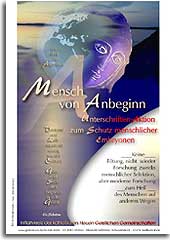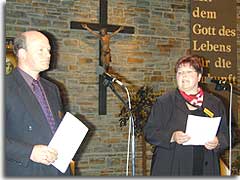 |
| Responses:
Working for the Protection and Dignity of Human Life - over 70,000
signatures, a clear statement in view of the stem cell research legislation,
collected in a joint effort of Schoenstatt Movement, Focolare Movement,
and Bread of Life Antworten: Gesellschaftspolitische Verantwortung in Blick auf Schutz und Würde des menschlichen Lebens; über 70.000 Unterschriften werden demnächst in Berlin vorgelegt - ein gemeinsamer Einsatz von Fokolar- und Schönstattbewegung, Brot des Lebens und anderen Gemeinschaften. |
| Plakate des Initiativkreises der geistlichen Gemeinschaften, Studio Anima, Elisabeth Schlömer © 2001 |
 |
| Ruth and Peter Fischer, Siegburg, Schoenstatt Family Movement, Archdiocese of Cologne, shared about the Initiative on the Leaders' Convention of the German Schoenstatt Movement in October 2001. |
| Foto: POS, Brehm © 2001 |
(mkf) They are highly motivated. Lay people from three Ecclesial Movements Focolare Movement, Schoenstatt, Bread of Life fulfilled what seemed 'mission impossible': Within a few months they collected over 71,000 signatures against the use of human embryos for scientific research. In a grass-root initiative without any given infrastructure, without financial and professional support, and in their free time left from family and work, members of all three movements succeeded in motivating people far beyond their own movements, and reached people from other denominations as well as Non-Christians. Since the start of the Initiative, 18 other movements, organizations and institutions have actively joined them. Presently, the Initiative is preparing to pass on the petition in Berlin and also protested to the European Parliament.
"We don't want human embryos to be made and used for medical and scientific research!" This is the basic statement of the Initiative. Many don't want that, and 71,000 people declared this with their signature on the petition. For those actively involved it was not enough to talk at study days, or church assembly: "Someone must do something against it!" They said: "We'll do it." "For us, each single human life is precious," stated Ruth and Peter Fischer, Schoenstatt Movement, parents of four children in kindergarten and grade school age. Since June 18, they organized and coordinated the Schoenstatt Movement's participation and are presently in charge of leading the Initiative's action in the European Parliament. "It can't be that human beings create human beings. It can't be that they use them, store them, freeze them, trash them, and treat them as an 'it' rather than a 'someone'. It was a hard endeavor and at times exhausting, but we just could not stand by, and it does not help to only pray and complain."
For a Culture of Life
Those who stand up against the production and use of human
embryos know that their opinion will not gain a majority vote. But they
also experience a widespread uneasiness in the population about the
matter, and the readiness of many to do something to change the course
of development. All over the world, in the Ecclesial Movements, in the
Christian Churches, and beyond, people want to work for a culture of
life, which will protect and value human life from the very beginning
to the end. In Schoenstatt, the Bioethical Congress in Argentina is
a trendsetter for spiritual and scientific work on the subject. Human
life, along with the issues of violence and social injustice are the
key questions and proof of a responsonsible and effective society.
Asked by journalists on a press conference held on November 14, in Rome,
at the end of congress on the ethical impact of stem cell research,
Mónica López Barahona, of the School of Biochemistry of
Francisco de Vitoria, said: "It is unacceptable to think of developing
an embryo to take his cells and then destroy him." López emphasized
that, from the scientific point of view, it is clear that the embryo
is a human person from the moment of conception and, therefore, it is
ethically unacceptable to use a human life even to save that of others.
Marked by Personal Initiatives
Neither Ruth and Peter Fischer, nor Ursula Dörpinghaus (Focolare Movement), nor Thomas Held (Bread of Life) knew at the beginning whether the petition would be successful. All of them are surprised with the dynamism that got more and more people involved and motivated to become active. "People from the movements, and other Christians, became active and took initiative," said Peter Fischer. A teacher at a school for nurses made the stem cell research and the question of extracting stem cells from human embryos a subject of classes; she presented the petition to the staff of the school, of the hospital, and to her parish. A nurse collected signatures in the retirement home where she works; Parish priests were asked by lay people whether they would allow the petition to be announced and presented in the parish; the manager of a centre for fasting informed her guests of whom several took lists to start the initiative back home. Elisabeth Schlömel, a Düsseldorf artist close to the Focolare movement, felt inspired to design a poster to promote the Initiative; several Schoenstatt publications printed the article introducing the Initiative. Some also included the lists so that the readers only had to cut and copy them. Members of the Focolare Movement worked on contacts with the press. The website (www.embryonenschutzinitiative.de) provides updates on the state of the Initiative. Information kits were spread via email to all German parishes, institutions and organizations found on the Catholic Net address book. Some time in August lists kept coming in that couldn't be traced back to any member of the Movements the Initiative had developed its own dynamism regardless of denomination or social status.
It's an experience of working as a team. The Ecclesial Movements that are involved each contribute according to their own experiences, and strengths. Dr. Ursula Dörpinghaus, Focolare Movement, offered the political contacts and experiences of her movement, Thomas Held used the website that he created and the contacts with the webmasters of the other Ecclesial Movements to mobilize the other Movement, and to offer a website with material and updates.
Individuals who made the Initiative their own marked it with their dedicated commitment. With her husband confined to bed due to a severe illness, and thus not being able to leave him alone, a woman organized the collection of signatures via telephone. Her husband supported her as much as possible. "This is very important to both of us, " she said. " We are so glad that we can do it, you know, we are Christians." Her husband did not live to see the 71,000 signatures to come in. "We are deeply touched by this elderly couple's testimony", Ruth Fischer said. "When we were at the point of giving up because of lacking support, it was also this couple that kept us going."
European Parliament Deciding on Funds for Stem Cell Research that Uses Human Embryos
The public almost did not notice the decision of the European Parliament's department in charge of industry, research, foreign trade, and energy for funds on stem cell research with embryos. As the decision was only made by 30 26 votes, the Initiative for the Protection of Human Embryos saw a realistic chance to prevent the decision in the European Parliament. After contacting the head of the Commission for Ethics, Dr. Peter Liese, on November 1 they sent an Open Letter to all German parliamentarians in Strasburg.
The Initiative has got strong support of influential people in Berlin. The result was an appointment probably at the end of November with the leader of the Conservatives' faction in the German Parliament, Friedrich Merz. They expect the other leaders to follow. The petition is most likely to be passed on to all political decision makers in November.
Other groups actively participating in the Initiative:
Kultur des Lebens e.V, "Rettet das ungeborene Leben" e. V., SOS LEBEN e.V., Charismatische Erneuerung im Bistum Münster, Chemin Neuf, Familien mit Christus, Gemeinschaft Agnus Dei, Jedidja, Jemael-international, KALEB, Stefanus-Gemeinschaft, Mut zum Leben e.V., Ökologisch-Demokratische Partei (ödp), CDL, Gemeinschaft Zion, Studierende von Communione e liberazione, Lebenshilfe e.V.
More:
- Homepage (in German) with updates on numbers of signatures: : http://www.embryonenschutzinitiative.de/
English edition: J.B.R., England